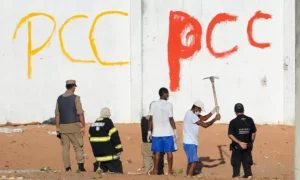In Santos Port, the largest in the Southern Hemisphere, a military team of 50 inspects a cargo ship. They scour 12 floors for six hours, using dogs and divers to find hidden drugs.
The PCC, a dominant criminal organization, now conceals cocaine in ships’ submerged parts to bypass authorities, using ports to ship drugs to Africa and Europe.
Following a government decree in November for Military Operations to Guarantee Law and Order (GLO) in São Paulo and Rio’s ports and airports until May, efforts intensified to curb drug trafficking.
Estadão witnessed the Navy’s operations and spoke with involved authorities.

Anderson Pomini, president of the Santos Port Authority, highlights a new tactic: attaching drugs to ship hulls using “sea boxes.”
Although this method doesn’t yield the largest seizures, it’s becoming popular due to its effectiveness against traditional hiding techniques.
Container trafficking to Europe and Africa faces high risks due to terminal scans. Thus, traffickers favor the less-monitored ship hulls, despite smaller shipment sizes.
An early 2023 operation seized 290 kg of cocaine from a ship’s hull, indicating traffickers’ adaptability.
Investigations reveal traffickers use boats or divers for smuggling, emphasizing the challenge of monitoring Santos Port’s extensive traffic.
With a significant rise in underwater trafficking, the Port Authority invests in technology and manpower to enhance inspections.
Despite the military’s presence deterring some smuggling efforts, only a fraction of departing ships undergo detailed inspections.
The Navy’s limited numbers highlight the ongoing struggle against organized crime’s evolving tactics.

